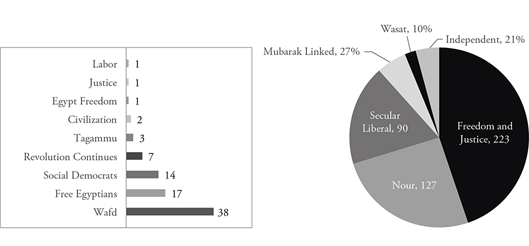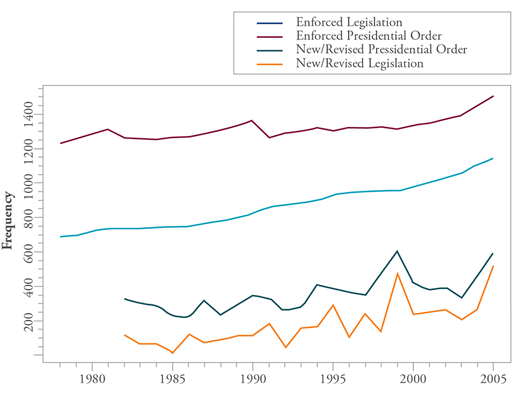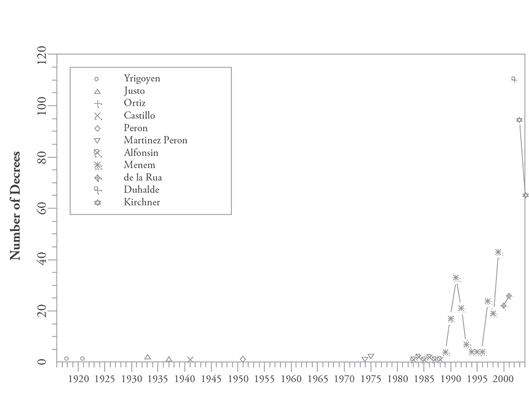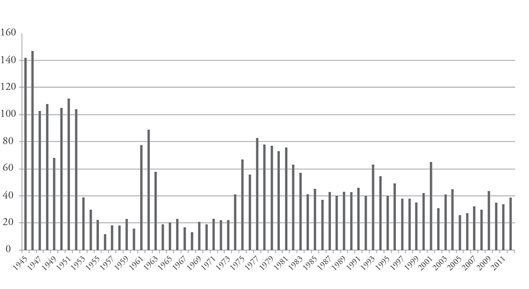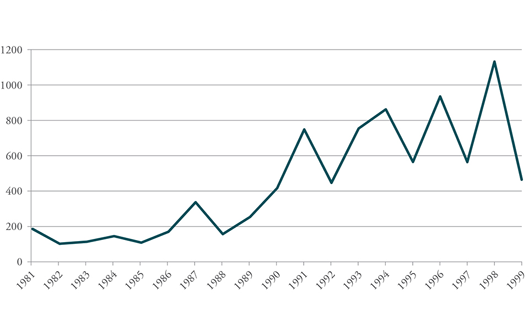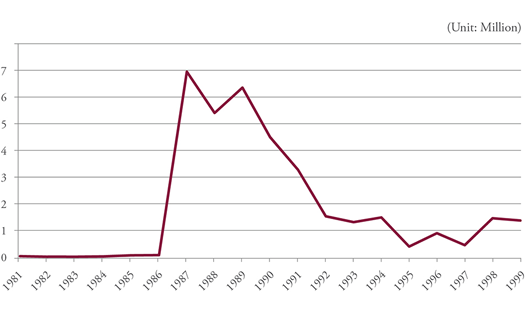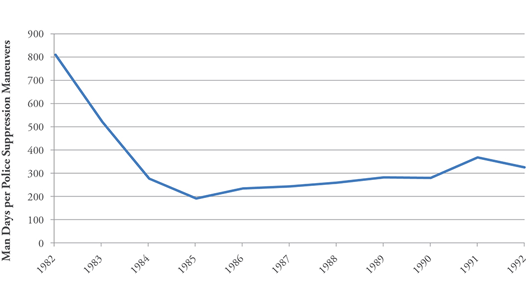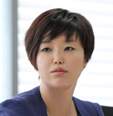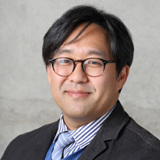Two years since the fall of Hosni Mubarak’s decades-long dictatorial regime, Muhammad Morsi, Egypt’s first democratically elected president, has managed to hammer out a new constitution which has withstood the test of a two-round referendum. Since then, opponents of the new constitution have gathered en masse to voice their dissent against the alleged Islamist reforms. Round after round of protests, first against the referendum and then against the administration, have been capped off by riots across Egypt.
As these events unfold, various pundits have weighed in on the precariousness of the transition currently underway in Egypt.1 The increasingly pessimistic outlook appears to stem from three observable trends — exclusion of minority interests, centralization of power around the executive, and heightened public unrest. Though reasonable, it is yet unclear as to whether these concerns are sufficient in posing a threat to Egypt’s political transition. The skepticism here is driven in part by the nature of the current debate, which is plagued by ad-hoc retrospective predictions often confusing outcomes for causes. The comment also applies more generally to many of the explanations offered by leading analysts of the broader phenomenon referred to as the “Arab Spring.” If we cannot identify the underlying causal factors then efforts to find recurrent patterns using comparative perspectives would prove more meaningful. Drawing on the experiences of other political transitions, this brief will outline the conditions under which the Egyptian transition process can be qualitatively assessed. In particular, we emphasize the importance of elections, a depoliticized military, and economic transformation.
It is important to emphasize that the end of dictatorship does not guarantee a stable nor effective democracy. New democracies often experience persistent conflict. Moreover, the path for new democracies is hardly deterministic or predictable. For instance, in the post-Arab Spring Middle East and North Africa, Libya has been surprisingly resilient in its progression towards further consolidation — the absence of basic state institutions or even a functioning state has not been a serious obstacle to the process of change. Thus, we maintain that it is too early to draw any strong conclusions about Egypt’s trajectory towards what Dankwart Rustow refers to as “democratic habituation.”2
Context Matters: Revisiting the Egyptian Transition
Broadly, the negative outlook on the current situation in Egypt can be attributed to three sets of concerns. One deals with the dominance of political Islam in Egyptian politics. In particular, there is a growing concern that minority interests represented by various non-Islamist groups will be systematically excluded from the political process. At the moment, the Freedom and Justice Party (FJP) representing the Muslim Brotherhood controls almost 45% of the seats in the Egyptian parliament along with the conservative Salafi Nour party which gained about 25%. The combined share of these two parties far outweighs that of any other parties in the parliament (See Figure 1). The skewed distribution of seats in the parliamentary body should not come as a surprise given that 90% of Egyptians are Sunni Muslim while the rest are of other religious leanings.
Figure 1: Distribution of Political Parties in the Egyptian Parliament
This characterization, however, fails to reveal the complexity of the Egyptian political landscape. As a matter of fact, minority interests do have significant representation in the parliament. Together, the secular liberal parties, such as al-Wafd, Free Egyptians, and Social Democrats among others, make up about 18% of the parliament (Figure 1). That is, the exclusion of secularists from policy reform in Egypt is hardly a foregone conclusion with a sizable number occupying seats in the legislative organ. Also, while a coalition between the Salafi Nour and the FJP is a possibility, evidence suggests that the FJP is equally willing to work with left leaning secularists like al-Wafd and the Social Democrats on vital policy matters.3 Finally, recent polling in Egypt also shows that only 16% of those who voted for the FJP support the role of religion in politics.4 In fact, the key issue of concern among most Egyptians appears to be the economy with 69% of those polled expressing the importance of basic necessities and addressing the income gap.5 What this suggests is that the fear over the exclusion of minority interests from important decision making processes requires some reality check.
The real problem stems from the fact that the opposition to the ruling party in Egypt is highly fragmented (See Figure 1). If this remains to be the case after the next round of elections, the lack of a strong opposition will empower the ruling party to dictate policy as it sees fit. One encouraging sign is that the opposition has coalesced around a single label of National Salvation Front (NSF) in recent months. How the NSF will fare in the new parliament remains to be seen. But to be legitimate, the opposition must be allowed to compete in a free and fair election. It is important to note, however, that there are cases where democracy has remained resilient despite the lack of a strong opposition. With the exception of a short 11 month spell in 1993-1994, the ruling Liberal Democratic Party single handedly steered policy making in Japan for almost 50 years until its defeat in 2009. In South Korea, it took 10 years before a genuine opposition party candidate could take control of the Blue House after the first democratic election in 1987. The key question is not whether there is equity in the representation of opposition parties but whether democracy will remain “the only game in town” for the opposition.6
The second issue of concern has to do with the centralization of power around the executive. Far too often, we find ourselves witnessing the emergence of popular leaders on the pedestal of mass support followed by outright usurpation. The uneasy juxtaposition of a powerful executive counterbalanced by a periodic election has allowed critics to question the virtue of these types of regimes or what Guillermo O’Donnell refers to as “delegative democracy.”7 President Morsi’s reliance on executive decrees to hasten the constitutional reform process and the new round of parliamentary elections is reminiscent of the types of regimes so-commonly found in parts of Latin America and Asia.
Figure 2: Executive Decree in South Korea and Argentina
If anything, the argument can be made that a strong presidency has complemented the slow-moving legislature to address the problem of policy gridlock when timely reform was in desperate need. Even more striking is the fact that presidents in the United States have not been shy about utilizing this power to set policy unilaterally (See Figure 3).
Figure 3: Executive Orders in the United States, 1945-2012
Finally, the explosion of protests and sieges in and around Cairo and other parts of Egypt could raise some red flags among concerned critics. If anything these protests are likely to continue and even become violent. Evidence from other transitions suggests, however, that increased mobilization and radicalism do not necessarily lead to a breakdown in the transition process.8 Evidence from South Korea is quite instructive in this regard. If we take a closer look into the number of
average participants per strike in the period immediately surrounding the transition in 1987, the trends suggest an increasing scale in the level of demonstration activity (See Figure 4).
Figure 4: Average Participants Per Strike in South Korea, 1981-1999
The annual trend in labor protests also shows a sharp spike around the time of the transition with the effect lingering for two to three years thereafter (See Figure 5).
Figure 5: Number of Working Day on Strike in South Korea, 1981-1999
One interesting fact is that the rise in activism did not coincide with any decline in the state’s enforcement activities. Note in Figure 6 that a rise in demonstrations was not matched by a corresponding rise in government crackdown (See Figure 6).
Figure 6: Average Duration of Police Suppression Maneuvers in South Korea, 1982-1992
Red Flags for Egypt’s Nascent Democracy
This, of course, does not mean we ought to favor naive indiscretion in place of disdain for a potentially explosive situation in Egypt. However, these seemingly worrisome trends did not present enough reasons to draw a premature conclusion on the outcome of the transition process in other cases. And we would contend that the same logic applies to the case of Egypt. Democracy is, after all, a process rather than an end. Nevertheless, lessons drawn from past experiences of democratic breakdown point to several critical factors that we ought to take more seriously if these developments do surface.
The first is the development of irreconcilable differences in the government leading to cleavages whereby the opposition opts not to participate in the democratic process. Democracy produces periodic winners and losers. But at its core, democracy is the loser’s game to play. If the Egyptian secular liberals refuse to take part in the democratic process (i.e. elections), then democracy no longer becomes the only game in town. Consequently, leading opposition figures such as Amr Mousa and Mohamed ElBaradei should move the discussion from an ‘all or nothing’ proposition to a more forward looking strategy about the long term viability of the opposition parties. Rather than boycotting the upcoming parliamentary elections, the NSF would fare better by coming up with a better campaign strategy which incorporates an economic dimension as some observers have suggested.9
The Morsi government, on the other hand, should do its utmost to guarantee the minimal conditions necessary to maintain the opposition’s faith in the democratic process. This is obviously easier said than done. Although Morsi is Egypt’s first democratically elected president, his administration suffers from a legitimacy deficit arising from the manner in which he took office. Recall the very narrow margin of victory over Ahmed Shafiq, a former prime minister under the Mubarak regime. In the first round of elections in May 2012, Morsi and Shafiq beat the more moderate Aboul Foutouh, an Islamist, and Amr Moussa, a liberal secularist. The choice between the two hard-line finalists left the revolutionary forces frustrated. Moreover, Morsi was not the Brotherhood’s first choice. As he encounters opposition on a daily basis, President Morsi should continue to rely on democratic practices which are ultimately beneficial to him as well. Democracy institutionalizes the uncertainty inherent within a political system by allowing for competition in free and fair elections.
The second factor relates to the military. The military plays a key role in upholding the territorial integrity of the nation-state. It is also what enables the state to maintain internal order if necessary to do so. However, if the military becomes a political player with active involvement in governmental affairs, there is a danger that it will play a role in hastening the reversal of the transition process.
Unfortunately, the Egyptian military has controlled the transition process since the ouster of Mubarak. That was why the United States decided to deal with the Egyptian military leadership directly during the uprising. Furthermore, the Egyptian army still possesses extensive vested interests in the national economy. This is a striking difference from the Tunisian military which never sought to seize power, was not a main player in the domestic economy, and therefore never had an
incentive to intervene in the democratic transition process.
Consequently, the key beneficiaries of the democratic process, including both the Morsi government and the NSF, should provide the military feasible incentives to stay out of politics. Without credible promises of amnesty, the Egyptian military will not give up power. A political pact between the military and civilian elites can be one option. Without depoliticizing the military, a coup d’état will always remain a distant possibility. Without a military that is loyal to a civilian administration and control, political cleavages among elite circles have the potential to devolve into a coup.10
Finally, regime performance will also prove critical as newly emerging democracies move to further legitimate their position among the people. Without good policies that can provide basic necessities or address problems with the distribution of wealth, there is strong impetus for people to take to the streets. Not surprisingly, the Muslim Brotherhood, which was long excluded from politics and thus never had a chance to gain experience in state management, has failed to put forward a clear economic agenda. Hence, the economic programs and state-building policies offered by the Morsi government have not minimized social costs. However, all acts of good statesmanship require some political sacrifices along the way. Initial reforms often turn out unpopular and have negative political consequences. Partly because democracy should listen to everyone, the system is not always economically efficient compared to authoritarianism. In the end, reforms that address the needs of the masses, however, become the basis for an enduring regime.
New Arab Democracies from a Comparative Perspective
For the past two years, pundits and critics have expressed pessimism about Egypt’s future due to its lack of preexisting norms, weak institutions, and a prevailing Islamic culture. With the parliamentary election scheduled for April now cancelled by court order, demonstrators have once again taken to the streets to decry Morsi’s “imperial” presidency while the NSF, a big tent covering 35 opposition organizations, continues to change its position on the upcoming election. However, our discussion of the democratization experiences in East Asia and Latin America shows that the current problems in Egypt, while disconcerting, are not unique or irreparable. Over-representation of Islamist interests, Morsi’s reliance on executive decrees, and increased mobilization and radicalism have yet to result in a regime breakdown in Cairo.
Furthermore, as Libya’s transition suggests, democracy is not an outcome of deterministic structures but of contingent interactions. Institutional experience with pluralism, autonomous socio-economic groups, state traditions, and independence from oil rents are all conducive to a smoother transition. However, the lack of those prerequisites in Libya did not necessarily result in the derailment of democratic transition. In order to minimize the cost of the prolonged transition and to preclude the possibility of a reversion towards authoritarianism, the key actors in Egypt should recognize that active participation in democracy is better than exclusion in a non-democracy. Democracy offers institutionalized predictability and a peaceful transition of power.
The Arab Spring marks a fundamental change in the Middle East and North Africa. However, it is important to keep in mind the fact that change is still underway in this part of the world. Much work remains to be done in Egypt, Tunisia, and Libya as the people in these countries all continue to experience challenges in their path towards democracy. However, the silver lining that we can take away from our analysis is that uncertainty and conflict do not necessarily contradict the spirit of change in countries like Egypt. Administrative or economic efficiency need not be a standing prerequisite for democracy; neither is order. As one preeminent scholar once put it, “political order is less secure in changing societies than in modern societies; yet so too are liberty, freedom, and other core values.”11
The views expressed herein do not necessarily reflect the views of the Asan Institute for Policy Studies.
- 1
Schneider, Cynthia. “U.S. gets it wrong on Egypt again” January 25, 2013. Special to CNN. Ian Black. “Egypt’s transition to democracy put in doubt as ‘militia’ add to polarisation.” The Guardian. January 28, 2013.
- 2
Rustow, Dankwart. “Transitions to Democracy: Toward a Dynamic Model.” Comparative Politics2 (1970): 3.
- 3
Fadel, Leila. “Egypt’s Next Parliament to be Led by Islamist.” The Washington Post. January 17, 2012.
- 4
Benstead, Lindsay, Ellen M. Lust, Dhafer Malouche, Gamal Soltan, and Jakob Wichmann. “How to Build Democracy in Egypt and Tunisia.” Foreign Affairs. February 14, 2013.
- 5
Ibid.
- 6
Przeworski, Adam. Democracy and Market. Cambridge: Cambridge University Press, 1991.
- 7
O’Donnell, Guillermo. “Delegative Democracy” Journal of Democracy 5 (1994): 1. 55-69.
- 8
Bermeo, Nancy. “Myths of Moderation: Confrontation and Conflict during Democratic Transitions.” Comparative Politics 29 (1997): 3. 305-322.
- 9
Hellyer, H. A. 2013. “Egypt’s Opposition has to be More than Anti-Brotherhood.” The National. January 6, 2013. Benstead, Lindsay, Ellen M. Lust, Dhafer Malouche, Gamal Soltan, and Jakob Wichmann. “How to Build Democracy in Egypt and Tunisia.” Foreign Affairs. February 14, 2013. Hamid, Shadi. 2010. “Egypt’s Old and New Opposition – And Why They Need Each Other” (http://www.brookings.edu/research/articles/2010/12/egypt-politics-hamid)
- 10
Linz, Juan J. & Alfred Stepan. The Breakdown of Democratic Regimes. Baltimore: The Johns Hopkins University Press, 1978.
- 11
Kesselman, Mark. “Order or Movement?: The Literature of Political Development as Ideology.” World Politics 26 (1973): 1. 139-154.

 Facebook
Facebook Twitter
Twitter